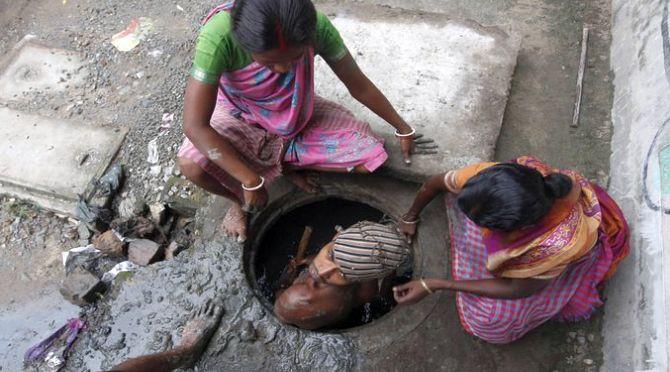Swachh Bharat, M.K. Gandhi and the Manual Scavengers

Image Courtesy: Rediff
The BJP government has appropriated the birth anniversary of Mohandas Karamchand Gandhi making it a day of “mission for cleanliness” in India, thereby limiting the discussions and debates on Gandhiji just to a PR stunt for the leaders and elite.
This article is in response to using Gandhi as an icon for cleanliness from the perspective of a worker who toils day in and day out, bearing the societal stink and contempt. In the debate, cleanliness and the “change of outlook” towards it, the worker - “Bhangi or the Valmiki” - is missing. An attempt is made to look at this debate from the lens of an activist whose mission is to annihilate manual scavenging from this country.
Yesterday was Mohandas Karamchand Gandhi’s birth anniversary, the icon of “Clean India Mission” for the present government. If there was anyone who found dignity in manual scavenging, it was Gandhi then, and it is Prime Minister Modi now. Modi claimed in his autobiography that manual scavenging is a spiritual experience. The discussion on the dignity of manual scavengers would also remain incomplete without looking at what Gandhi said and did to the Balmiki community. The word “Balmiki” and the work of manual scavenging got its sanctity and sacredness when Gandhi called this a beautiful name and said “I love scavenging”. He further glorified it by comparing it to the service of a mother to her children. He said that, “A Bhangi does for society what a mother does for her baby. A mother washes her baby off the dirt and insures his health. Even so the Bhangi protects and safeguards the health of the entire community by maintaining sanitation for it.” (Gandhi in Harijan, 28/11/1936, as cited in Ramaswamy 2005: 90). Bezwada Wilson in the foreword to Ramaswamy’s book asks, “How can one feel proud of cleaning the worm-filled, stench-producing shits of millions every day?” (Ramaswamy 2005: vii).
Gandhi went on to glorify the caste-sanctioned manual scavenging further: “How sacred is this work of cleanliness! That work can be done only by a Brahmin or by a Bhangi. The Brahmin may do it in his wisdom, the Bhangi in ignorance.” (ibid.: 86). Did he mean to say that Bhangis are ignorant people? Or they are doing manual scavenging because they are ignorant? Who keeps them ignorant? Will this kind of people ever allow Bhangis to gain education and remove the ignorance? And by saying this, Gandhi meant to motivate Bhangis to do this dirty work with full consciousness and wisdom.
Gandhi used the non-violent way of ‘strike’ as a means to fight for his demands throughout his life, but for Bhangis he opined that, “A Bhangi may not give up his work even for a day.” (Gandhi in Harijan, 21/04/1946, as cited in Ramaswamy 2005: 92). He was well aware of what will happen if Bhangis went on a strike! He stated: “I do not regard it my duty to teach [Bhangis] to wrest their rights by the way of the West. (iii) It is not our dharma to gain anything by that method.” (Gandhi in Navajivan, 11/01/1925, as cited in Ramaswamy 2005: 87) (iv). He was not concerned about sanitation but he was concerned about the varnashrama dharma, that if Bhangis get even one day of break from work, they may get time to think afresh about this dirty inhuman work and may pose a challenge to the hierarchical structure of Hindu religion. So, instead of including Bhangis in Satyagraha, Gandhi preferred to let calm them down by religiously praising this work.
For Bhangis’ economic strength, Gandhi was of the view that a Bhangi “would not dream of amassing wealth out of it.” [sanitation work] (Gandhi in Harijan, 28/11/1936, as cited in Ramaswamy 2005: 92). So now Bhangis can’t even think of earning money out of this forced work! Why didn’t he say simply that Bhangis should live at the mercy of caste Hindus—live like slaves—living carrions! Here, even a foolish person can ask that if Bhangis won’t dream of wealth, how will they survive and what will they eat? Will they remain half nude like Gandhi and wear only the clothes they make in their leisure time, or will they get to live in corporate-sponsored ashrams like Gandhi?
Gandhi was a staunch follower of Hinduism and in the pursuit of keeping the Hindu system alive, he tried hard to kill the Dalit movement for dignity that Ambedkar called for. Gandhi closed all doors for the socio-economic, educational, politico-cultural, and mental development of the most depressed people in India and left them with no other option than just cleaning shit their whole lives. Dr. Ambedkar called these ideas of Gandhi as “The doom of the Untouchable” (Ramaswamy 2005: 96).
Gandhi’s hypocrisy is evident from this one particular incident. Once, some Balmikis invited Gandhi to eat with them, but he refused. He said to them, “you can offer me goat’s milk,… but I will pay for it. If you are keen that I should take food prepared by you, you can come here [Gandhi’s ashram] and prepare my food for me”. When an untouchable offered Gandhi some nuts to eat, he fed them to his goat saying that he would eat them later, in the goat’s milk. Gandhi covertly practiced untouchability in his personal life while publicly pretended to fight untouchability. However, his casteist behavior was known to his followers and must have motivated them to continue practicing untouchability in matters of food (Prasad 2000: 139). Gandhi did not just teach his followers the non-violent methods of mass movement; he also taught his followers such strategies of practicing hypocrisy - pretending to be egalitarian while secretly being casteist and upholding the caste hierarchy.
Gandhi did and preached all the wrong for manual scavengers and left them to live a miserable life, to die serving the castes oppressing them. Gandhi’s preaching is still instilled and inseparable from the mind and body of the manual scavengers in India. Gandhi encouraged them to love scavenging, Hindu religion, and its caste order, and these are perhaps some important reasons why the Balmiki community’s socio-economic status has remained the same and they are again and again failing to liberate themselves from this undignified work. Gandhi only spoke of reforming the chaturvarna order and Hinduism without questioning the whole oppressive order of the caste system that subjugates the untouchables.
Gandhi’s reformist intentions were strongly opposed and criticized by Ambedkar. Babasaheb Ambedkar thundered that this occupation should not be glorified but banned with immediate effect. Dr. Ambedkar asked for an immediate ban on manual scavenging and said Bhangi Jharoo Choro (Bhangi, Leave the Broom). To the present day, many people are demanding an immediate ban on manual scavenging. And this, not Gandhi’s Gandhigiri, is also the ultimate means through which these Bhangis will be freed from their servitude. Today, on Gandhi’s birth anniversary, we remind ourselves of the injustice done to our people when they chose to follow him. Manual scavenging, wrapped in Gandhigiri and nationalism, was offered to them again, this time to be chosen voluntarily so that it cannot even be claimed to be unjust. Today we remind ourselves that Dr. Ambedkar’s voice was overpowered by Gandhi’s, justice was overpowered by injustice and discrimination which came in the disguise of a Mahatma. Today let us remind ourselves to never follow any Mahatma who comes to serve us selflessly by telling us how we should feel and think and what we should do. Today let us pledge to fight such Mahatmahood and Gandhigiri with the thoughts of Dr. Ambedkar and the path he chose.
*Dhamma Dharshan Nigam works with Safai Karmachari Andolan
The author would like to thank Sriti and Sheeva for their inputs in writing this article.
Endnotes:
i. https://navayana.org/blog/2014/09/30/but-can-we-sweep-caste-away/ accessed on 02/10/2017 .
ii. Why is it also necessary to note the date of Gandhi’s write-up in his newspaper Harijan? Because by this time Ambedkar had logically argued in his essay Annihilation of Caste that “the real method of breaking up the caste system was not to bring about inter-caste dinners and inter-caste marriages but to destroy the religious notions on which caste was founded,” (Ambedkar 1936[2014]: 199) and Ambedkar and Gandhi had also exchanged their replies and counter replies over Annihilation of Caste. However, Gandhi was still propagating manual scavenging religiously and was only helping in strengthening the caste system further.
iii. It would be noteworthy to see whether Gandhi ever looked for western methods in his whole life. Or he never wanted so for Balmikis only. What were these western methods? What wrong he found in those western methods? What was he wanted if not western methods? It was for sure the Varna and Caste hierarchy which he wanted to maintain, which is apparent in his note in Navajivan, 11/01/1925.
iv. It is important to note that Gandhi was consistent in his position on Bhangis, which we have found here from his notes in his newspapers from 1925 to 1946. It will be also important to see that was he also concerned about any other caste lower in Hindu caste hierarchy. Or he was concerned about Bhangis only and why?
References:
Ambedkar, B.R. (1936[2014]). Annihilation of Caste (The Annotated Critical Edition). New
Delhi: Navayana.
Prashad, Vijay. (2000). Untouchable Freedom: A Social History of a Dalit Community. New
Delhi: Oxford University Press.
Ramaswamy, Gita. (2005). India Stinking: Manual Scavengers in Andhra Pradesh and their
work. New Delhi: Navayana.
Disclaimer: The views expressed here are the author's personal views, and do not necessarily represent the views of Newsclick.
Get the latest reports & analysis with people's perspective on Protests, movements & deep analytical videos, discussions of the current affairs in your Telegram app. Subscribe to NewsClick's Telegram channel & get Real-Time updates on stories, as they get published on our website.
























